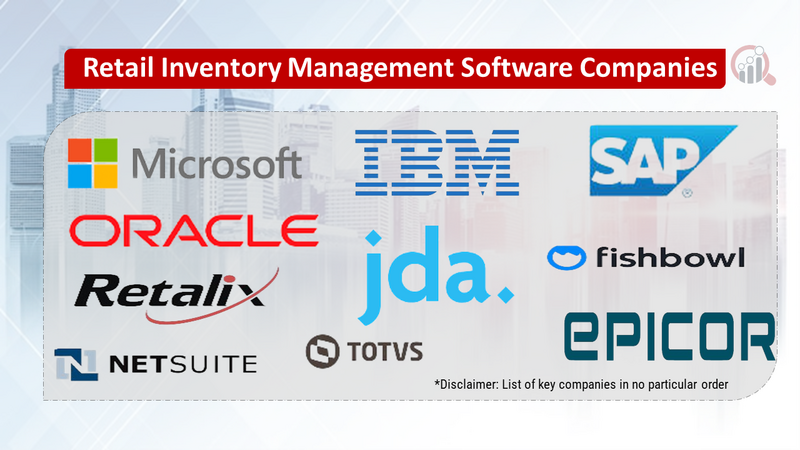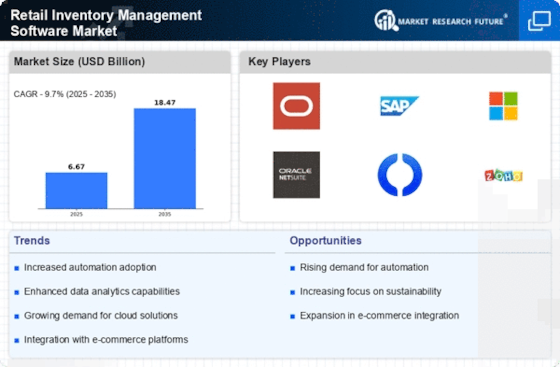Top Industry Leaders in the Retail Inventory Management Software Market

Retail Inventory Management Software Market: News and Updates
In the bustling world of retail, where stocks dance a delicate tango with demand, efficient inventory management reigns supreme. This report delves into the dynamic Retail Inventory Management Software (RIMS) market. The retail inventory management software market is booming, fueled by the need for retailers to optimize operations, boost efficiency, and adapt to changing consumer demands.
Some of Retail Inventory Management Software Companies Listed Below:
- Epicor Software Corporation (U.S.)
- Oracle Corporation (U.S.)
- SAP SE (Germany)
- Microsoft Corporation (U.S.)
- JDA Software (U.S.), Netsuite (U.S.)
- Fishbowl (U.S.)
- InFlow Inventory Software (Canada)
- IBM Corporation (U.S.)
- Totvs S.A (Brazil)
- Retalix Ltd (Israel)
- Quintiq (Netherlands)
- Sage Group plc (U.K)
- Logility, Inc (U.S.)
- Lawson Software (U.S.)
- Aldata Software Management Inc (Canada)
- Accellos (U.S.)
- BluJay Solutions. (U.S.)
- Kinaxis (Canada)
- Kewill Systems (U.S.)
- Manhattan Associates (U.S.)
- Servigistics (U.S.)
- GTNexus (U.S.)
Strategies Fueling Growth:
-
Focus on Data-Driven Insights and Analytics: Providing robust reporting tools, real-time inventory visibility, and advanced data analysis capabilities empowers retailers to make informed decisions about stock levels, pricing, and promotions. -
Integrated Supply Chain Management: Offering seamless integration with procurement, warehousing, and logistics systems creates a unified view of inventory across the entire supply chain, optimizing resource utilization and minimizing stockouts. -
Omnichannel Inventory Management: Enabling real-time inventory visibility across physical stores and online platforms caters to the omnichannel shopping experience, fulfilling orders efficiently regardless of channel. -
Embracing AI and Machine Learning: Integrating AI-powered features for demand forecasting, automated order optimization, and dynamic pricing helps retailers stay ahead of trends and maximize profitability.
Market Share Decoding: Key Factors to Consider
-
Functionality and Feature Set: Platforms offering a comprehensive range of features for forecasting, purchasing, order management, warehouse management, and reporting hold an edge in catering to diverse retail needs. -
Scalability and Deployment Options: Providing flexible deployment models (cloud-based, on-premise, hybrid) and the ability to scale with business growth attracts retailers of all sizes and growth stages. -
Industry Specialization and Domain Expertise: Players possessing in-depth knowledge of specific retail segments (fashion, grocery, electronics) can tailor solutions to address unique inventory challenges and operational nuances. -
Cost-Effectiveness and Pricing Models: Affordable pricing plans and flexible subscription models cater to budget constraints and make RIMS solutions accessible to a wider range of retailers.
New and Emerging Stars: Illuminating the Inventory Path
-
IoT and Sensor Integration: Companies like Zebra Technologies and Smart Shelf are deploying connected devices and sensors for real-time inventory tracking, automated stock updates, and optimizing warehouse picking processes. -
Voice-Activated Inventory Management: Startups like Vocollect and Voxware are pioneering voice-enabled RIMS solutions, enhancing efficiency and reducing errors in warehouse operations. -
Blockchain-Based Supply Chain Transparency: Companies like Skuchain and Everledger are exploring blockchain technology for secure and transparent tracking of inventory movement, building trust and enhancing sustainability practices.
Investment Trends: Where the Capital Flows
-
AI and Machine Learning Development: Investors are backing companies building AI-powered RIMS features for automated forecasting, dynamic pricing, and predictive stock replenishment. -
Cloud-Based Deployment and Subscription Models: The shift towards cloud adoption drives investments in scalable, secure, and subscription-based RIMS platforms catering to small and medium-sized retailers. -
Focus on Omnichannel and Frictionless Shopping: With the rise of omnichannel retail, investors are backing solutions that facilitate seamless inventory management across online and offline channels. -
Partnerships and Ecosystem Building: Strategic partnerships between RIMS providers, technology vendors, and logistics companies accelerate innovation and create comprehensive solutions for optimized inventory management.
Latest Company Updates:
-
October 20, 2023: Manhattan Associates acquires Wombat Technology, a provider of AI-driven inventory optimization solutions, to strengthen its offering in omnichannel inventory management. -
September 19, 2023: JDA Supply Chain Management unveils its "Luminate Control Tower," a cloud-based platform offering real-time inventory visibility and AI-powered insights for managing complex supply chains. -
August 18, 2023: SAP launches its "S/4HANA Cloud" with enhanced inventory management capabilities, including demand forecasting and automated replenishment suggestions.











